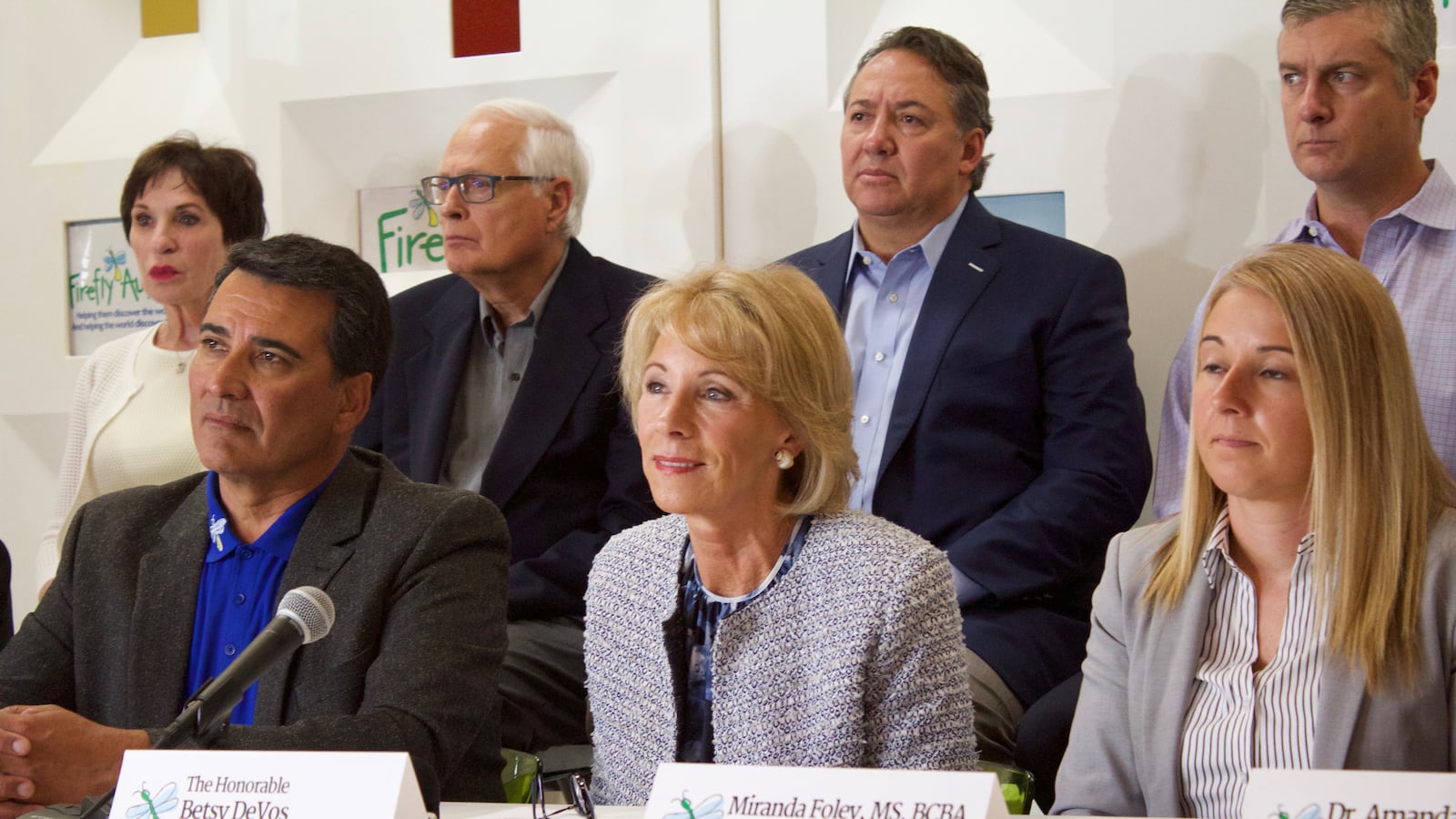U.S. Education Secretary Betsy DeVos, flanked by school officials at a private autism center in Denver, called on the nation’s public schools to work with parents to better serve students with special needs.
Minimum progress for students with disabilities, she said, “is preposterous. Our students deserve better.”
DeVos’s statement comes nearly six months after the U.S. Supreme Court issued a landmark ruling that set a new — and higher — standard for how schools educate students with special needs.
DeVos spoke Wednesday after touring the Firefly Autism center as part of her first multi-state tour as education secretary.
The location was in keeping with the theme of what the federal education department is billing the “Rethink Schools” tour. DeVos is promoting a vision of school choice that includes a roster of schools that fill niches serving students with particular needs. The premise, for DeVos, is that schools haven’t changed significantly in a century and are in need of a reboot.
“We must rethink what education means for every student,” she said in Denver. “Different students living in different places demand different solutions.”
The Denver-based autism center was chosen not just because of its specialization but because of its role in the landmark Supreme Court case that involved a south suburban Denver family.
The family decided to pull their son, known in court filings as Endrew F., from the Douglas County School District after his learning stalled. They subsequently enrolled Endrew at Firefly, where tuition can run up to $78,000 per year.
The family sued the school district seeking reimbursement. The family claimed the district failed to provide Endrew with a “free appropriate public education,” as required under federal law.
Lawyers for the school district argued that educators were meeting the minimum standard required by the law.
The U.S. Supreme Court sided with Endrew’s family. In doing so, the court raised the standard schools must meet to educate students with disabilities. Chief Justice John Roberts wrote in his opinion, a higher standard “requires an educational program reasonably calculated to enable a child to make progress appropriate in light of the child’s circumstances.”
The high court also referred the question of whether the district should reimburse the family back to lower courts.
DeVos on Wednesday did not issue any new department directives or give any indication of what the standard for serving students with special needs should be.
During her comments, DeVos did criticize “artificial barriers” schools create to meet the needs of students. She did not identify those barriers.
“When it comes to educating students with special needs,” she said, “failure is not an option.”
DeVos said parents should have the freedom to choose whichever school best meet their students’ needs.
“They shouldn’t have to sue their way to the Supreme Court,” she said.
Firefly’s expensive programs are paid for by a variety of sources. In most cases, school districts unable to serve students cover the cost of tuition, Firefly officials said. Private insurance and Medicaid also contribute. Only about 1 percent of the center’s budget comes directly from families.
Nineteen students from eight school districts are enrolled at Firefly. One student from Limon, on Colorado’s Eastern Plains, travels nearly four hours a day round trip to attend the center.
Firefly Executive Director Jesse Ogas said he told DeVos that the state’s public schools — and their tax dollars — were critical to Firefly.
“I never want to discount how important our school districts are,” he said. “It’s a strong partnership and without our district partners, we wouldn’t be here today.”
He added that the school districts aren’t receiving the federal dollars they were promised to educate students with special needs.
“They’re not funded at the level they should be,” he said.
Ogas said DeVos, a critic of the traditional public school system, was open to his concerns about funding and the role it plays in supporting students after they’re enrolled in Firefly. Not only do school districts pay for students to attend the center, they often provide transportation and help complete federally required individualized education plans for students.
How — and where — to best serve students with special needs is an ongoing debate in public education. Many advocates for students with disabilities favor full inclusion in schools and, when possible, general education classrooms. Those who embrace specialized centers like Firefly may see the setting as a bridge to a more inclusive environment.
In Denver Public Schools, district officials and charter school operators are operating under a compact that calls for charter schools to open centers for students when special needs when asked.
After her remarks in Denver, DeVos was scheduled to tour the Air Force Academy in Colorado Springs.
In visiting a private center serving children with autism and a college campus that is also a military installation, DeVos limited the potential for the kinds of public protests that have followed her on other trips. Hundreds turned out in July to protest DeVos’s appearance at a conservative political conference in Denver.
On Wednesday, no more than a handful of protesters shadowed DeVos outside the Firefly autism center, holding signs in support of a program that provides protections for young immigrants. The Trump administration has announced it will roll back the Deferred Action for Childhood Arrivals, or DACA, initiative. DeVos has said her “heart is with” DACA recipients but indicated lawmakers must settle the issue.
Correction: This article has been updated to reflect that the U.S. Supreme Court did issue some new guidance in what a higher standard for special education is.

